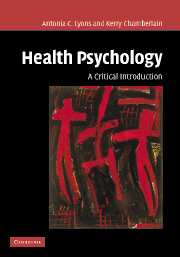Book contents
- Frontmatter
- Contents
- Acknowledgements
- Setting out: using this book
- 1 Locating the field: introducing health psychology
- 2 Thinking about health and the body
- 3 Choosing lifestyles
- 4 Controlling the body
- 5 Becoming ill
- 6 Comprehending bodily experience
- 7 Interacting with health professionals
- 8 Treating illness
- 9 Being ill
- 10 Dying
- 11 Relocating the field: critical health psychology
- Glossary
- References
- Author index
- Subject index
- References
9 - Being ill
Published online by Cambridge University Press: 05 June 2012
- Frontmatter
- Contents
- Acknowledgements
- Setting out: using this book
- 1 Locating the field: introducing health psychology
- 2 Thinking about health and the body
- 3 Choosing lifestyles
- 4 Controlling the body
- 5 Becoming ill
- 6 Comprehending bodily experience
- 7 Interacting with health professionals
- 8 Treating illness
- 9 Being ill
- 10 Dying
- 11 Relocating the field: critical health psychology
- Glossary
- References
- Author index
- Subject index
- References
Summary
[B]ecoming ill (especially chronically, or seriously ill) colours people's lives. The use of the word ‘colours’ refers to the way that everyday life is reflected through either the knowledge that one is ill, or the way that ordinary actions are affected by bodily limitations … Illness, once given form by the social realm that it metaphorically colours, can then inflect other domains of experience with new meaning. In turn, they provide another reflection upon the illness situation, so that it, too, is once more re-figured … Because it is always reflected through social realms, and because the reflection of these realms, one against the other, is the way in which individuals display their worth and competence, then being ill is not a specific state, but an inflection of the whole of the person's being.
(Radley, 1999a, pp. 19–22)Learning objectives
The aim of this chapter is to consider the experience of illness, including factors that are important in adjusting to and recovering from illness, approaches taken to researching and theorising being ill, ways in which illness is presented, and issues involved in caring for ill people. By the end of this chapter you should be able to:
describe the extent of illness in contemporary Western society;
critically evaluate research on coping with illness;
outline the various ways in which people with illness find support;
discuss how illness can have positive as well as negative effects;
outline arguments for and against considering illness as a crisis requiring adjustment;
explain what is meant by quality of life and discuss its value in research on illness;
[…]
- Type
- Chapter
- Information
- Health PsychologyA Critical Introduction, pp. 279 - 318Publisher: Cambridge University PressPrint publication year: 2006
References
- 1
- Cited by



